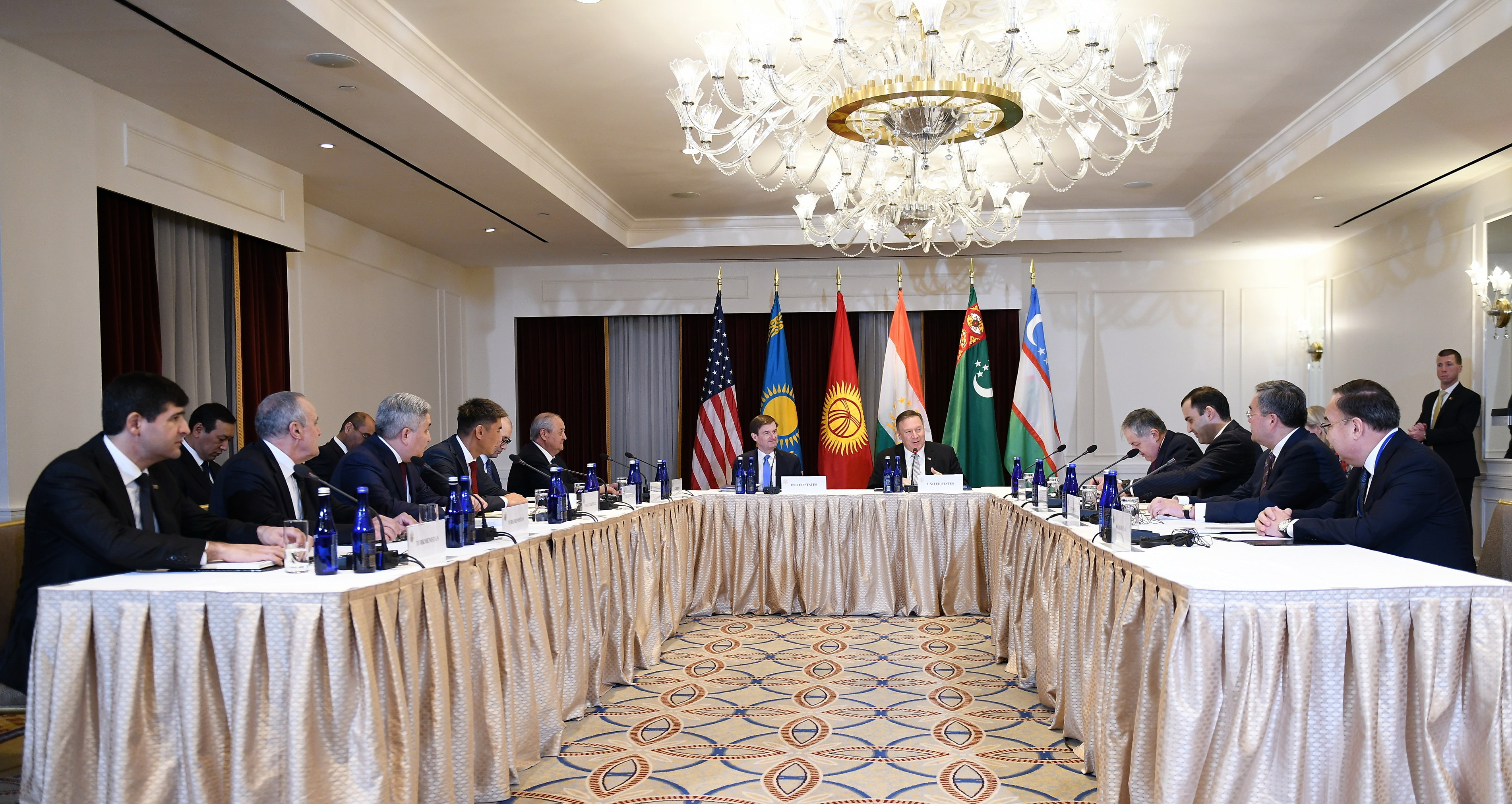Elvira Kadyrova
On 22 September, a regular ministerial meeting of Central Asia+USA (C5+1) was held in New York. The gathering was attended by the U.S. Secretary of State Michael Pompeo, foreign minister of Kazakhstan, Mukhtar Tleuberdi, foreign minister of Kyrgyzstan, Chingiz Aidarbekov, foreign minister of Tajikistan, Sirodjidin Mohiddin, foreign minister of Uzbekistan, Abdulaziz Kamilov and Turkmen Ambassador to the US, Mered Orazov.
As reported in their press releases, the foreign ministries of the participating countries, the main topics of the meeting included:
- Expansion of trade and investment ties
- Infrastructure development of the region, including through the funds of the US International Development Finance Corporation
- Security issues with focus on Afghanistan and cooperation in the fight against terrorism and extremism.

Political, economic and security issues are more or less routine items on the agenda of the C5+1 dialogue. Central Asian foreign ministers and the US Undersecretary of State David Hale had already discussed these topics in the capital of Kazakhstan, Nur Sultan, just a month ago-on 21 August. Within the same format, but at the level of Central Asian ambassadors, on 6 September, the State Department hosted a meeting chaired by acting Assistant for the Bureau of South and Central Asia, Alice Wells.
So, how did the current C5+1 discussion in New York differ from previous meetings? The answer can be quoted from the remarks by Secretary Michael R. Pompeo, where he sounded “new ways that our nations [USA and Kazakhstan, Kyrgyzstan, Tajikistan, Turkmenistan and Uzbekistan] can cooperate.”
“We must absolutely work together on counterterrorism, especially on the difficult but critical task of returning, prosecuting, and reintegrating foreign terrorist fighters and their families. The United States can help you figure out how best to do that and assist you in your process”, he stated.
Then, Pompeo referred to China:
“And further on the subject of terrorism, I want to make clear that China’s repressive campaign in Xinjiang is not about terrorism. It’s about China’s attempt – about China’s attempt to erase its own citizens’ Muslim faith and culture. We call on all countries to resist China’s demands to repatriate Uighurs.”
Pompeo also underlined that Trump administration takes border security concerns very seriously:
“We don’t want terrorists or drug traffickers to be able to cross your borders with impunity. Greater cooperation on this issue with Central Asia and with Afghanistan will help guarantee the security of your nations and your people”.
Finally, US State Secretary hinted at the prospects of American investments into regional infrastructure projects. “We, of course, respect your right to do business with whomever you wish. But when you do, consider how America does business – openly and fairly and on mutually beneficial terms,” he said, telling about the possibility of independent experts assessing the infrastructure investments in their countries.
* * *
When it comes to the Central Asian line of the White House’s foreign policy, it should be kept in mind that Central Asia is a convenient springboard to the zones of strategic rivalry interests such as Iran, Afghanistan, China and Russia.
Therefore, it is necessary to consider the future/current US moves and intentions in relation to Central Asia, together with how Washington behaves with the nearest neighbors of the Central Asian region:
- After the C5+1 meeting, Pompeo again called on the world community to resist China in its campaign to repatriate ethnic Uighurs from other countries. It seems that State Secretary decided to employ USA’s hot rhetoric of rights violations of the Uighur Sunni Muslims in XUAR (by the way, the land so rich in mineral resources and oil) in a dialogue with Central Asia, where the majority of the population professes Islam. Nevertheless, the fact remains -China has been, is and will be a strategic economic partner of Central Asia, and where the US talks on readiness to “discuss prospects”, Chinese workers and loans have long been operating on the ground.
- Last week, USA announced a decision to suspend US $ 160 million in aid to Afghanistan due to financial fraud and corruption of the Afghan government. US $ 100 million were intended for the major energy project – the construction of substations that would feed electricity to the cities of Kandahar and Ghazni. Another US $ 60 million will be withheld due to lack of transparency in financial management.
- In the aftermath of the attacks on oil facilities in Saudi Arabia, the United States imposed another severe embargo against Iran. The sanctions imposed on Iran’s Central Bank and the National Development Fund of Iran are aimed at bringing to naught Iran’s remaining trade relations with Europe and Asia, as all those who do any business with Iran will be accused of supporting terrorism. /// nCa, 24 September 2019